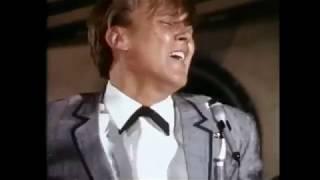Louis Armstrong performs Up A Lazy River, Old Rockin' Chair (duet with trombonist/singer Jack Teagarden), & When The Saints Go Marching In.
Louis Armstrong (August 4, 1901 -- July 6, 1971), nicknamed Satchmo or Pops, was an American jazz trumpeter and singer from New Orleans, Louisiana. Coming to prominence in the 1920s as an "inventive" trumpet and cornet player, Armstrong was a foundational influence in jazz, shifting the focus of the music from collective improvisation to solo performance. With his instantly recognizable gravelly voice, Armstrong was also an influential singer, demonstrating great dexterity as an improviser, bending the lyrics and melody of a song for expressive purposes. He was also skilled at scat singing (vocalizing using sounds and syllables instead of actual lyrics).
Renowned for his charismatic stage presence and voice almost as much as for his trumpet-playing, Armstrong's influence extends well beyond jazz music, and by the end of his career in the 1960s, he was widely regarded as a profound influence on popular music in general. Armstrong was one of the first truly popular African-American entertainers to "cross over", whose skin color was secondary to his music in an America that was severely racially divided. He rarely publicly politicized his race, often to the dismay of fellow African-Americans, but took a well-publicized stand for desegregation during the Little Rock Crisis. His artistry and personality allowed him socially acceptable access to the upper echelons of American society that were highly restricted for a black man.
Jazz on a Summer's Day (1960) is a documentary film set at the 1958 Newport Jazz Festival in Rhode Island, co-filmed and co-directed by commercial and fashion photographer Bert Stern and director Aram Avakian, who also edited the movie. It was written by Albert D'Annibale and Arnold Perl. The Columbia Records jazz producer, George Avakian, was the musical director of the film.
The film mixes images of water and the city with the performers and audience at the festival. It also features scenes of the 1958 America's Cup yacht races. The film is largely without dialog or narration (except for periodic announcements by emcee Willis Conover).
The film features performances by Jimmy Giuffre, Thelonious Monk, Sonny Stitt, Anita O'Day, Dinah Washington, Gerry Mulligan, Chuck Berry, Louis Armstrong, and Jack Teagarden. Also appearing are Buck Clayton, Jo Jones, Armando Peraza, and Eli's Chosen Six, the Yale College student ensemble that included trombonist Roswell Rudd, shown driving around Newport in a convertible jalopy, playing Dixieland.
Many performances ran so long that the last act, Mahalia Jackson, did not appear on stage until after midnight, performing The Lord's Prayer.
In 1999, the film was selected for preservation in the United States National Film Registry by the Library of Congress as being "culturally, historically, or aesthetically significant".
Louis Armstrong (August 4, 1901 -- July 6, 1971), nicknamed Satchmo or Pops, was an American jazz trumpeter and singer from New Orleans, Louisiana. Coming to prominence in the 1920s as an "inventive" trumpet and cornet player, Armstrong was a foundational influence in jazz, shifting the focus of the music from collective improvisation to solo performance. With his instantly recognizable gravelly voice, Armstrong was also an influential singer, demonstrating great dexterity as an improviser, bending the lyrics and melody of a song for expressive purposes. He was also skilled at scat singing (vocalizing using sounds and syllables instead of actual lyrics).
Renowned for his charismatic stage presence and voice almost as much as for his trumpet-playing, Armstrong's influence extends well beyond jazz music, and by the end of his career in the 1960s, he was widely regarded as a profound influence on popular music in general. Armstrong was one of the first truly popular African-American entertainers to "cross over", whose skin color was secondary to his music in an America that was severely racially divided. He rarely publicly politicized his race, often to the dismay of fellow African-Americans, but took a well-publicized stand for desegregation during the Little Rock Crisis. His artistry and personality allowed him socially acceptable access to the upper echelons of American society that were highly restricted for a black man.
Jazz on a Summer's Day (1960) is a documentary film set at the 1958 Newport Jazz Festival in Rhode Island, co-filmed and co-directed by commercial and fashion photographer Bert Stern and director Aram Avakian, who also edited the movie. It was written by Albert D'Annibale and Arnold Perl. The Columbia Records jazz producer, George Avakian, was the musical director of the film.
The film mixes images of water and the city with the performers and audience at the festival. It also features scenes of the 1958 America's Cup yacht races. The film is largely without dialog or narration (except for periodic announcements by emcee Willis Conover).
The film features performances by Jimmy Giuffre, Thelonious Monk, Sonny Stitt, Anita O'Day, Dinah Washington, Gerry Mulligan, Chuck Berry, Louis Armstrong, and Jack Teagarden. Also appearing are Buck Clayton, Jo Jones, Armando Peraza, and Eli's Chosen Six, the Yale College student ensemble that included trombonist Roswell Rudd, shown driving around Newport in a convertible jalopy, playing Dixieland.
Many performances ran so long that the last act, Mahalia Jackson, did not appear on stage until after midnight, performing The Lord's Prayer.
In 1999, the film was selected for preservation in the United States National Film Registry by the Library of Congress as being "culturally, historically, or aesthetically significant".
- Category
- Jazz
Sign in or sign up to post comments.
Be the first to comment


